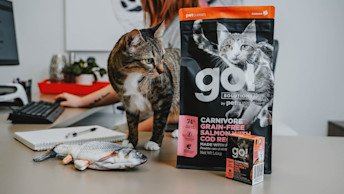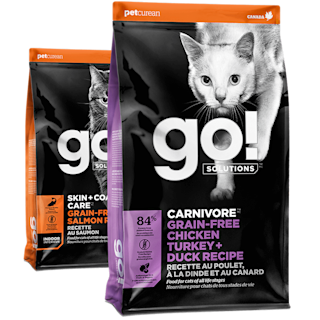November 4, 2022
Essential Vitamins in Cat Food

There are so many vitamins to keep track of – does my cat really need them all? Yes! The same vitamins that are required for our own well-being also help to strengthen the overall health and welfare of our pets. From supporting the immune system and red blood cell formation to promoting skin and coat quality and bone and dental health, vitamins are essential nutrients required by your pet to thrive. Keep reading to learn more about how you can ensure that your cat is receiving all of their required vitamins and their benefits!
How can you ensure that your pet is receiving all of these essential vitamins?
Based on nutritional science, we know that we cannot always meet the minimum requirements of vitamins using natural ingredients alone. Don’t panic – vitamin supplementation is used in both kibble and wet pet foods to ensure that they contain all of the nutrients required to sustain life and support the health and welfare of your furry friend!
Natural vs synthetic vitamins
The word ‘synthetic’ does not automatically mean that something is inferior. Vitamin manufacturers have developed sophisticated technologies to produce the most useful and stable forms of individual vitamins, which are well utilized and handled by the body. Many factors are taken into consideration when designing a vitamin or mineral premix, including nutrient quality, bioavailability, stability, and physical characteristics. Whether it is a vitamin, mineral, or other nutritional supplements, strict quality control is put in place to ensure consistency and safety.
In pet food, vitamins and minerals are usually added as a ‘premix’. Premixes help ensure the correct level of nutrients are evenly distributed in the finished product.
Furthermore, since many nutrients react with other food components, adequate stabilization protects the nutrient from degradation and is critical to ensuring correct nutrient levels in the food. There is no research to support defining synthetic vitamins as dangerous when fed at appropriate levels for dogs and cats. Any nutrient can be harmful if fed at excessive levels, whether the source is from foods or supplements.
Two Categories of Vitamins
There are two types of vitamins: fat-soluble and water-soluble. The fat-soluble vitamins include A, D, E, and K, and are stored in the body. Over-supplementing with these vitamins can have a toxic effect on pets.
Water-soluble vitamins include B-complex vitamins and vitamin C. Any excess in these vitamins will be excreted in the urine and will rarely accumulate to toxic levels.
Fat-Soluble Vitamins
Vitamin A (vitamin A supplement, beta-carotene): essential for skin, coat, muscle and nerve function. Beta-carotene is an antioxidant that plays an important role in vision and immunity. Dogs can convert beta-carotene to vitamin A, whereas cats cannot.
Vitamin D (vitamin D3 supplement, vitamin D2 supplement): plays a vital role in bone health as it is essential for the metabolism of calcium and phosphorus. Unlike humans, pets are unable to produce sufficient vitamin D with sunlight exposure.
Vitamin E (vitamin E supplement): provides antioxidant and immune system support. Vitamin E works synergistically with selenium.
Vitamin K: found in leafy green vegetables, vitamin K plays an essential role in blood clotting.

Water-Soluble Vitamins
Thiamine (thiamin mononitrate): also known as vitamin B1, thiamine is essential for the brain and other organs.
Riboflavin: also known as vitamin B2, riboflavin is essential for the metabolism of carbohydrates, fats, and protein to produce energy.
Niacin: also known as vitamin B3, niacin, like riboflavin, is involved in producing energy from carbohydrate, protein, and fat metabolism.
Pantothenic acid (d-calcium pantothenate): also known as vitamin B5, pantothenic acid is essential for making blood cells, and helps convert carbohydrates, fats, and proteins into energy.
Pyridoxine (pyridoxine hydrochloride): also known as vitamin B6, pyridoxine helps maintain the health of nerves, skin and red blood cells. It also plays an important role in regulating blood glucose.
Biotin: also known as vitamin B7, biotin is essential for carbohydrate, fat, and protein metabolism. It also plays a role in supporting healthy skin, coat, and nails.
Folate (folic acid): also known vitamin B9, folate plays a critical role in the production of new cells and DNA synthesis. It is also involved in the immune system and production of red and white blood cells.
Cobalamin (vitamin B12 supplement): also known as vitamin B12, cobalamin is essential for a healthy nervous system, brain function, formation and growth of blood cells, and intestinal health.
Vitamin C (L-ascorbyl-2-polyphosphate): necessary for the growth, development, and repair of body tissues. It is also involved in the formation of collagen and acts as an antioxidant in the body.
Choline(choline chloride): choline is not a true vitamin, but is an essential nutrient involved in functions that overlap with other B vitamins. Choline plays a role in fat metabolism and is also essential for building and maintaining cell structure and healthy skin.

Recommended Solution
Solutions for Your Pet's Unique Dietary Needs
If your cat is a picky eater, has a dull coat, or food sensitivities, feeding them a solutions-based food may be the answer to many issues.
All Cat Recipes
Check out our selection of high-quality diets to find a balanced recipe that works for your pet. Next time you take your multivitamin, you can be sure that your cat is getting the essential vitamins that they need to!


